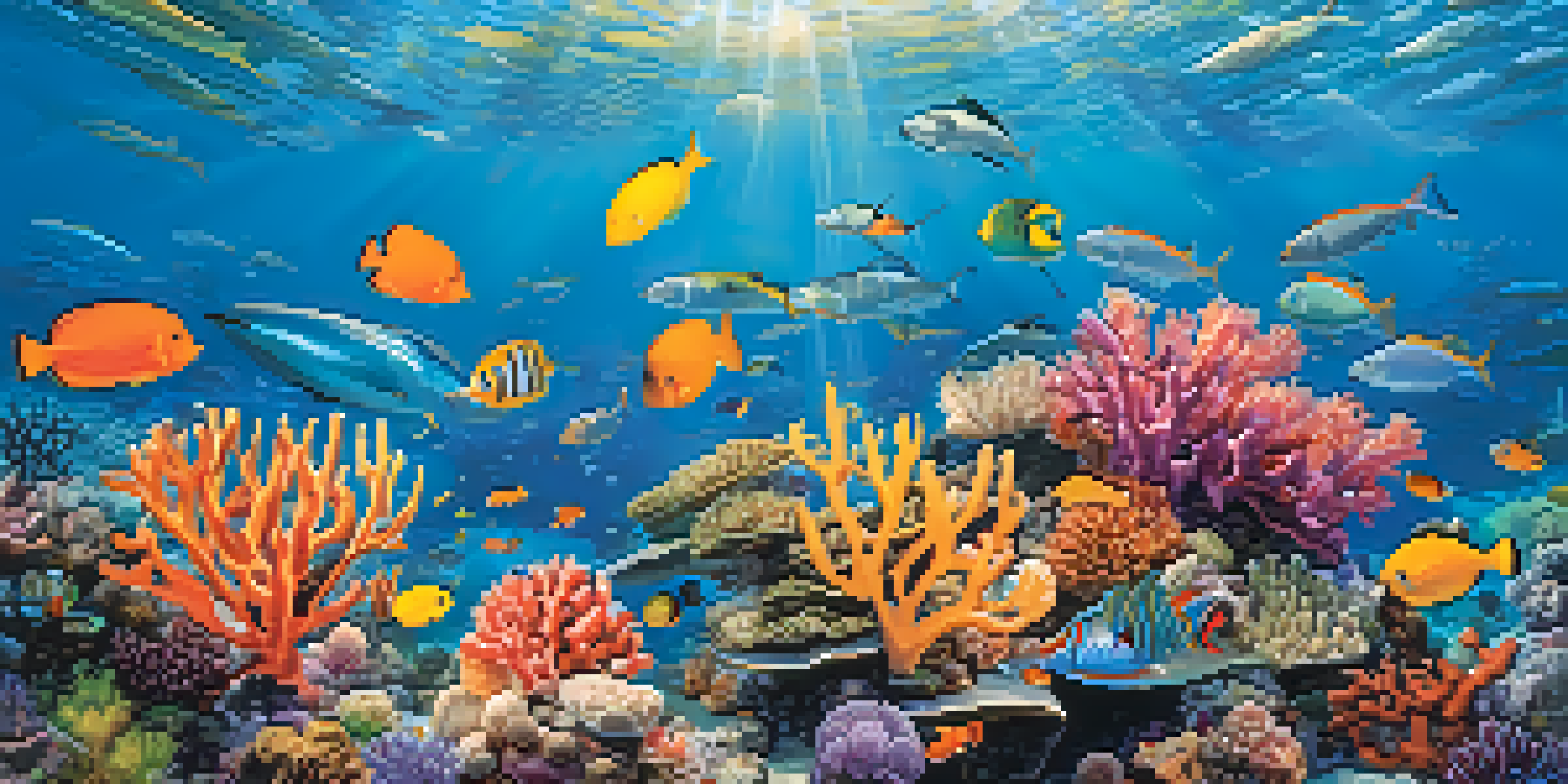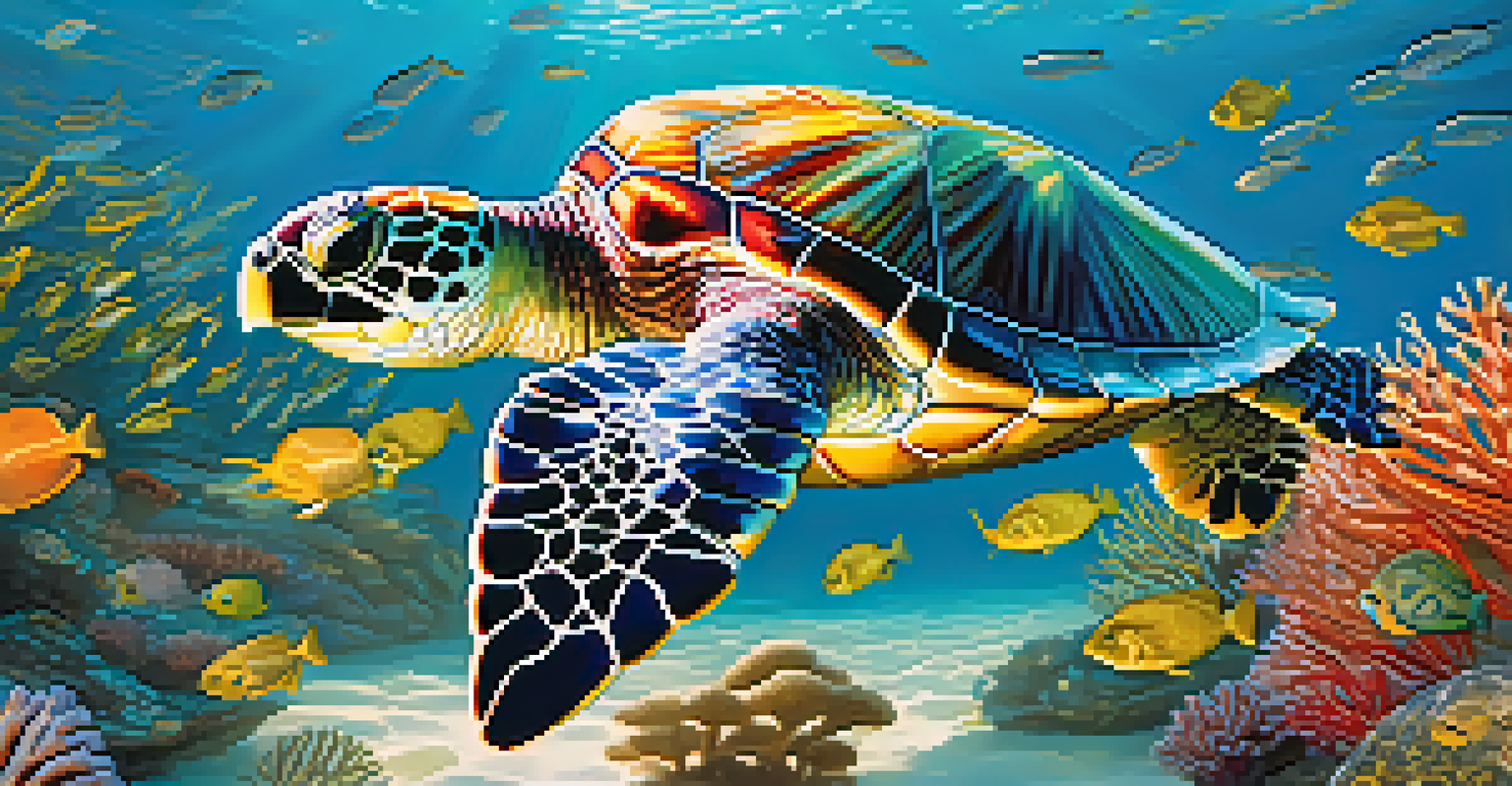Common Marine Life Encountered While Scuba Diving

Understanding the Colorful World of Coral Reefs
Coral reefs are often referred to as the 'rainforests of the sea' due to their rich biodiversity. These vibrant ecosystems are home to countless species, providing shelter and food for marine life. As you dive, you'll likely be greeted by the stunning array of colors from both the corals and the fish that inhabit them.
The sea, once it casts its spell, holds one in its net of wonder forever.
The corals themselves are fascinating structures made up of tiny animals called polyps. They come in various shapes and sizes, creating a beautiful underwater landscape. Keep an eye out for the intricate relationships between corals and the fish that rely on them for protection and sustenance.
Exploring coral reefs not only reveals the beauty of marine life but also highlights the importance of conservation. Protecting these ecosystems is crucial, as they face threats from climate change and pollution, making your experience a reminder of our responsibility to preserve these underwater wonders.
Encountering Majestic Fish Species While Diving
One of the most exciting aspects of scuba diving is the chance to encounter various fish species. From colorful clownfish hiding among anemones to the graceful movements of parrotfish, each dive presents unique opportunities to observe these creatures in their natural habitat. You might even spot a school of shimmering sardines darting around, creating a mesmerizing spectacle.

Fish are not just beautiful to look at; they play essential roles in the marine ecosystem. For example, cleaner wrasses help keep other fish healthy by eating parasites off their bodies. Observing these relationships can deepen your appreciation for the underwater world and its intricate balance.
Coral Reefs: Biodiversity Hotspots
Coral reefs, known as the 'rainforests of the sea,' are vital ecosystems teeming with diverse marine life.
Remember, approaching fish calmly and quietly can enhance your diving experience. Avoid sudden movements or loud noises, as they can startle these creatures. Instead, take your time and enjoy the fascinating interactions that unfold before your eyes.
Spotting Graceful Sea Turtles on Your Dive
Sea turtles are among the most cherished marine animals that divers hope to encounter. These ancient creatures glide effortlessly through the water, embodying a sense of calm and grace. Many divers find themselves captivated by their gentle nature and curiosity, often swimming alongside them for a few magical moments.
We won't have a society if we destroy the environment.
There are several species of sea turtles, including the hawksbill and green turtle, each with unique characteristics. For instance, hawksbills are known for their beautiful, patterned shells and are often found near coral reefs. Spotting a sea turtle can feel like meeting a living fossil, reminding us of the ocean's long history.
It's important to maintain a respectful distance when observing sea turtles. These animals are protected by law in many areas, and getting too close can cause them stress. Enjoying their presence from a distance allows you to appreciate their beauty while ensuring their well-being.
Discovering the Enigmatic World of Sharks
For many divers, encountering sharks is a thrilling highlight of their underwater adventures. Sharks, often misunderstood, are vital to the health of marine ecosystems and come in various species, from the majestic whale shark to the sleek reef shark. Watching them in their natural habitat can be both exhilarating and humbling.
Sharks play a crucial role in maintaining balance in the ocean, controlling fish populations and ensuring healthy ecosystems. By observing their behavior, you can gain insight into the intricate web of life beneath the waves. It's a reminder of why conservation efforts are so essential for these remarkable creatures.
Respect Marine Life While Diving
Responsible diving practices, such as maintaining a safe distance from marine animals, are crucial for their protection.
If you do encounter a shark while diving, remember to stay calm and avoid sudden movements. Most sharks are not aggressive and are more curious than anything. Enjoy the moment and appreciate the opportunity to witness these magnificent animals up close.
Encountering Playful Marine Mammals Underwater
Diving provides a unique chance to encounter marine mammals, such as dolphins and seals, known for their playful nature. These intelligent creatures often exhibit curiosity towards divers, creating unforgettable experiences. A pod of dolphins swimming alongside you can turn an ordinary dive into an extraordinary adventure.
Dolphins, for instance, are known for their social behavior and often travel in groups, or pods. Watching them communicate and play in the water can be a breathtaking experience, highlighting their complex social structures. Similarly, seals can be found lounging on rocks or swimming gracefully through the water, showcasing their agility.
When encountering marine mammals, it's essential to respect their space. Observing from a distance allows you to appreciate their natural behaviors without causing them stress. Remember, you're a guest in their world, and treating them with respect ensures that these interactions can continue for future divers.
Exploring Fascinating Invertebrates of the Ocean
Invertebrates make up a significant portion of marine life, and they come in an astonishing variety of shapes and sizes. From colorful nudibranchs to the intricate patterns of octopuses, these creatures can be both beautiful and bizarre. Diving allows you to observe these lesser-known inhabitants up close, revealing their unique adaptations and behaviors.
For example, octopuses are renowned for their intelligence and ability to camouflage themselves in their surroundings. Watching one change color and texture can be a mesmerizing sight. Similarly, jellyfish, with their graceful movements and ethereal appearance, add a touch of magic to the underwater world.
Importance of Conservation Efforts
Conserving marine ecosystems ensures that future generations can experience the beauty and complexity of underwater life.
While invertebrates may not have the same fame as larger marine animals, they play crucial roles in the ecosystem. They contribute to nutrient cycling and serve as food for many fish species. Taking the time to appreciate these fascinating creatures can enhance your understanding of marine biodiversity.
The Importance of Responsible Diving Practices
As you explore the wonders of marine life while scuba diving, it's essential to prioritize responsible diving practices. This means being mindful of your interactions with the environment and the creatures you encounter. Simple actions, like avoiding touching coral or disturbing marine life, can make a significant difference in preserving these ecosystems.
Educating yourself about the local marine environment and its inhabitants can also enhance your diving experience. Understanding the delicate balance of these ecosystems fosters respect and appreciation for marine life. Plus, it empowers you to make informed choices that benefit the ocean.

Ultimately, responsible diving ensures that future generations can enjoy the same breathtaking experiences you have. By committing to sustainable practices, you contribute to the protection of these underwater worlds, allowing them to thrive for years to come.
Conclusion: Embracing the Beauty of Marine Life
Diving into the ocean opens a gateway to an incredible world filled with diverse marine life. From colorful coral reefs to majestic sea turtles, each encounter enhances your appreciation for the beauty and complexity of underwater ecosystems. Every dive offers a unique adventure, filled with surprises and discoveries.
As you explore, remember the importance of conservation and responsible practices. Protecting marine life ensures that these vibrant ecosystems remain intact for future generations of divers to enjoy. Your actions, no matter how small, can contribute to the health of our oceans.
So, whether you're a seasoned diver or a beginner, embrace the chance to witness the wonders of marine life. Each dive is a step into a world of beauty, reminding us of our connection to the ocean and the responsibility we hold to protect it.